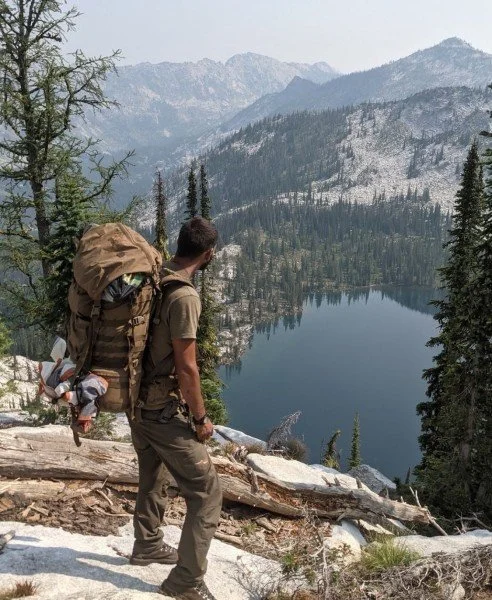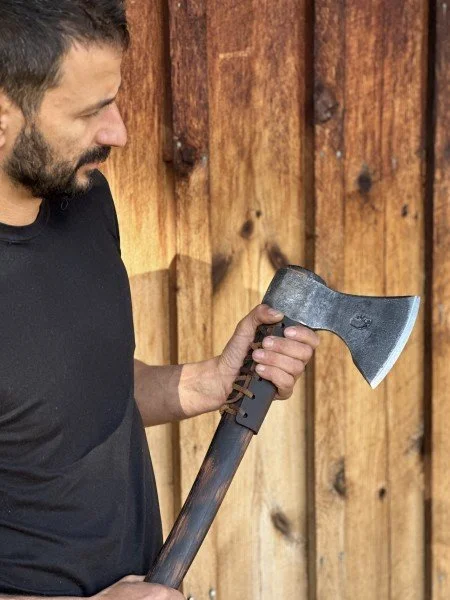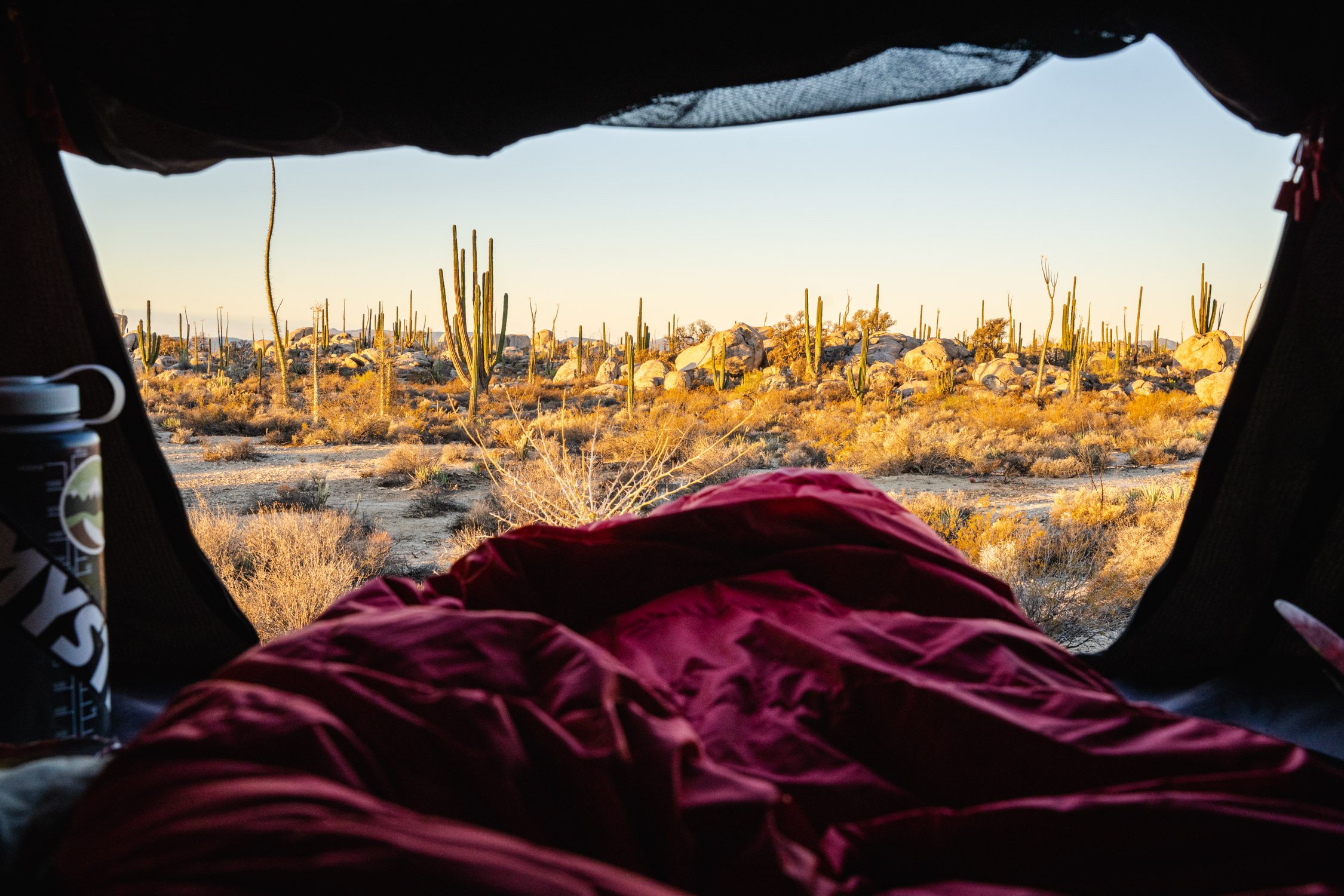Sitting around a campfire, I heard a booming laugh and a story about surviving in the arctic wilderness for 77 days. Of course, this peaked my interest. So, I turned my shoulder and listened to Jordan Jonas tell his story of his time on Alone, season 6.
While I had heard rumors of the show, I wasn't quite sure what it entailed. Thankfully, that evening around the campfire, I had the pleasure of getting to know Jonas and we kept in touch. After a few messages back and forth, trying to balance the crazy schedule Jonas has, we were able to answer a Q&A's about Alone, wilderness survival, and Siberia.
So, scroll down and learn what it takes to survive in the woods:
Background Information
Q: Who are you?
A: My name is Jordan Jonas. I am someone who has had a unique life path and am a product of my family, experience, values, failures, successes etc..
Q: Where are you from?
A: I was born in Idaho and currently live in Montana.
Q: How did you acquire your survival skills?
A: I grew up on a farm in Idaho, and naturally was into the outdoors. However, what really set my path apart from the norm was a combination of traveling around the country on freight trains as a young man, followed by spending much of my 20s in Siberia, Russia; including several years with fur trappers and nomadic reindeer herders.
It was those years in Siberia that really ingrained essential survival skills into me. Setting me a part from my peers.
Q: How would most people know you?
A: Most people know me from my win on season 6 of the Alone show and having been the first person to successfully hunt big game on the show (both a moose and a wolverine).
Q: Where can people follow you and learn about wilderness survival?
A: The best place to follow me is on Instagram @hobojordo. However, I also have a website jordanjonas.com that has a lot of information about myself, expeditions and hunts I offer. Also, some behind the scenes footage from alone amongst other things are on my website.
Spending Your 20s in Siberia
Q: Why did you go to Siberia?
A: I initially went to Siberia when I was 21 to help build an orphanage.
Q: Who did you stay with?
A: I initially lived with an American during the construction of the orphanage, however I quickly moved to a neighboring village where I immersed myself in Russian and bounced between a couple families - helping them with farm chores and village tasks.
Ultimately, I met up with an Evenki fur trapper who invited me North to join him trapping. After a season trapping I lived with his nomadic reindeer herding cousins in the taiga [a sometimes swampy coniferous forest].
That was a way of life I quickly fell in love with.
Q: How long were you there?
A: I spent the majority of my 20’s there: a little over 5 years in total. I would work construction jobs in the US to make money, head to Russia for a year at a time, and come back to the US to work and support my travels.
Q: Tell me a story that brings a smile to your face about your time there?
A: I remember at one point on a cold spring day riding a reindeer alone through a seemingly endless swamp in the middle of the taiga miles from camp. I dismounted the reindeer and hopped from hummock to hummock (tufts of grass that rise above the swamp) as I neared a raging spring river.
I had been the cause of many long laughs in the forest for my uncanny ability to fall off of the reindeer right into the creeks, so as I approached the cold, raging waters all I could think was “don’t fall off, don’t fall off”… the last thing I wanted was to get soaked and swept down a frigid northern river.
I balanced on the last wobbly hummock before the river and pulled my reindeer (Dlinii was his name- “long” in Russian as he was one of the only reindeer that would fit my tall frame) up parallel to myself, and without hesitation just hopped on his back.
Dlinii stumbled forward and splashed into the river but quickly lost his footing and dropped to his knees. I popped my legs up to keep them out of the water and with full concentration maintained my balance as Dlinii struggled to his feet and powered forward while he was pushed downstream by the strong current.
As he stumbled his way across and approached the opposite shore and a deep underwater current I dove off of him and grabbed onto the alder bushes, pulling myself up: meanwhile he lost his footing and nearly got swept away- however I held his reins and pulled him onto the shore next to me.
Dlinii and I sat on the bank and I couldnt help but smile that I wasn’t soaked, at Dlinii’s bulging eyes that expressed perfectly “that was crazy!”, and the ironic fact that no one saw and no one would share in the joy that was that solitary but consequential victory in the middle of that seemingly infinite wilderness.
A small win that somehow sticks out to me amongst the countless other successes and failures that where swallowed up by the vastness of the area and lost to history and consciousness.
Q: Would you go back?
A: I would love to go back, however between Covid and now the war it seems like a distant possibility.
How to Win Alone, the TV Show
Q: Transitioning to Alone, how did you get on the show?
A: I watched the first couple seasons and, struck by the fact that the contestants seemingly weren’t hunting bears, sent in an application with a link to my YouTube videos of living with the Evenki.
It wasn’t until three years later that the casting crew called me and asked me to join season 6!
Q: How did you do?
A: It honestly couldn’t of gone any better.
I was most nervous about my thin frame and fast metabolism so food was of utmost concern. However, in the course of the show I was able to procure 28 rabbits, 37 mice, 6 squirrels, a grouse, 13 large fish (including lake trout, pike, whitefish, and grayling), a wolverine and a moose.
When the show ended, I weighed my normal weight and still had 60lbs of fish, 200lbs of moose, a wolverine, 10 or so rabbits, a pile of mice, and a squirrel. I was set to last a very long time.
Q: Why do you think you won?
A: I think it’s a combination of a couple things:
The mental aspect that was buttressed by experience and an understanding of history that allowed me to put all my suffering and time into perspective
The physical aspect that was enabled by my prior experience and created the foundation for successful living.
Also, on the spot ingenuity that helped create opportunities when confronted with novel problems.
Without both the mental ability to deal with hardship or the physical ability to thrive and “make it happen” any attempt to last out there would end in failure.
Q: Did you watch the season once it aired?
A: I did! It made for a really fun summer with friends and family as they watched my experience unfold and I was able to share with them that aspect of my abilities and life that had previously been unknown, or, at least, only understood through the fog of my stories.
Q: Three reasons you were successful?
A: I will point out three words that came to mind as I realized in real time out there that I was truly thriving; ingenuity, adaptability, and resilience.
Having constantly dwelt outside of my comfort zone in life I was able to face trials and failures without getting flustered. That allowed me to approach problems creatively quickly and is what I consider the “ingenuity”.
I was also able to adapt in real time to unpredictable circumstances as I expected the worst.
Of course I had plans. I had plans to hunt a bear, to catch fish right away, etc.. however, as those opportunities didn’t present themselves, I was able to change my focus and take advantage of opportunities as they arose. Being flexible in my mindset, skill set, and strategy allowed me to flow with the land and be in the “zone”.
Resilience: Knowing my own family history (my grandparents were survivors of the Armenian/Assyrian genocide), watching my own father face death and suffering with joy and purpose, reading history and good literature, not having major skeletons in my closet, and having already endured personal hardship all played a role in putting my suffering on Alone into perspective.
That allowed me to approach the experience in its proper context.
Was it the most isolated I’ve ever been? No.
That was the first year I spent in Russia fully immersed and not knowing the language.
Was it the most hungry I’d been? No.
That was when I dwindled down to 150 lbs working the reindeer fences in Siberia.
Was it a long time? No..
77 days doesn’t even shake a stick at the year long ventures I had embarked on before.
And I knew my family would still be there, I knew my ancestors had dealt with much more both emotionally and physically. I could just view Alone for what it was: an opportunity.
A Guide, an Axe Builder, a Survivalist
Q: What do you do now?
A: I guide people on various mountain adventures: including in the most remote wilderness in the lower 48.
From survival training, expeditions to remote locations, to hardcore backpack hunts: I help share the knowledge and experience that had so enriched my own life with others as they immerse themselves in the beauty and lessons the outdoors has for us all.
Q: Describe what goes on during your guided trips?
A: I typically take people to places I love, and share with them the skills I find most important that enable a person to confidently exist in the wilderness.
My courses focus less on “getting out” and more on how to thrive and make the most of the outdoors.
Q: What would I learn if I came along?
A: From building fires, traps, and much more to how to push yourself to your limits and dwell on the edge of your aptitude.
I also like to share the rhythms of wilderness living that I experienced living with the Evenki and that humans have lived in for almost all of their time on earth, but have recently lost.
They will see how quickly people connect with one another when disconnected from distractions, how at peace they can be when not overly scheduled, and more.
Q: What is the difference between the Wilderness Course and Explore's Expedition?
A: The wilderness courses are a skills focused week in the remote wilderness. Typically less arduous physically than the Explorers Expeditions (though they aren’t without difficulty).
We typically arrive on location by a variety of means (bush plane, hiking, llama/horses packing gear, etc) and stay in camp while we learn various skills and rhythms of the outdoors. These are the courses I have run for years and every time I do one they are unique and fun.
I often bring in other guest teachers to help with specific skills that might enrich the students love of the outdoors (i.e. former Alone contestants to share their knowledge and angle on the experience, Master fly fishermen to help students acquire that skill, etc)
The explorers expeditions are a bit more hard core: the places we go and mountains we cross are places rarely frequented by humans; and for good reason. They are remote and incredibly difficult to get to.
The reward is immense, though, as you finally crest that mountain and see that seemingly untouched lake, or as you discover a mountain meadow or sight never before appreciated by another human. Or as you spark up that large warm fire after a day of rain. We make our way through the woods and at camp learn relevant skills: but the focus is exploration and the requirement is physical fitness and mental toughness.
Q: Three most important things to know how to do in the woods?
Build fire. Without that skill a simple rainstorm can be a disaster. You also need it to boil water and stay warm.
Get sleep. This can be knowing how to create a proper shelter, how to stay warm, get dry, and much more. Even a short outing in the woods can be rough if you don’t sleep, but on a long trip bad sleep will lead to sleep deprivation and mistakes.
Be controlled and careful. I have a natural tendency to rush things, and I have had to learn to slow down with experience. Nothing can take you out faster than an injury: a misplaced step, an uncontrolled axe swing, etc. this also includes controlling your emotions: don’t get too upset when things don’t go as you’d like or expect.
Q: Most important piece of gear?
A: Well the Evenki would always say: an axe is the one tool you need to have a chance at survival. With that in mind, I have actually designed what I consider to be the perfect all around wilderness living axe. With Siberian inspiration, Evenki design tweaks, my own modifications, and North American hand forged craftsmanship I don’t think there is a better axe for general forest use!
You can own your own axe at: jordanjonas.com/axe
Q: How can I go on one of your trips?
A: If you go to jordanjonas.com/expeditions and enter your email I will let you know when the 2024 schedule drops - probably in early December!









